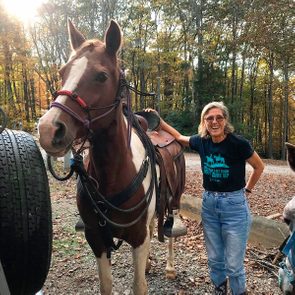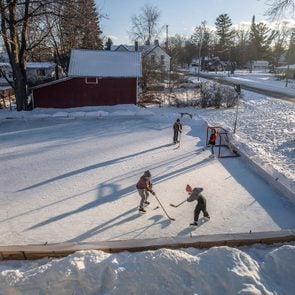These Neighbors Helped Save Ranch Animals During a Wildfire—and Made Coulterville, California the Nicest Place in America
Updated: Nov. 28, 2022
When a wildfire threatened their tight-knit community, residents of Coulterville, California stepped up to help neighbors in need
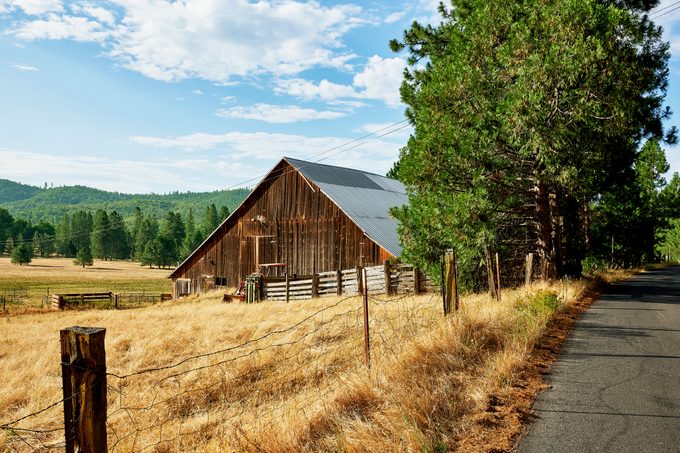
Not many nice places shower their residents with burning embers. But on that hot August day in 2020, as ash rained down and flames closed in, Jim Rhodes didn’t want to be anywhere but Coulterville, California.
“My kid called from Alabama. We first heard about the fire from him,” Rhodes recalls. “He said, ‘Evacuate!’ I said, ‘Evacuate? To where?’ ”
Coulterville is a tiny town in Northern California, about 150 miles inland from San Francisco, nestled among dry hills where ranchers raise cattle and other livestock. The nearest sizeable town, Mariposa, is 26 miles away. Once Mexican territory and later a gold rush boom town, Coulterville is barely a crossroads today. It has a Main Street, a park and a museum. It’s got a cafe, a consignment shop and a VFW post.
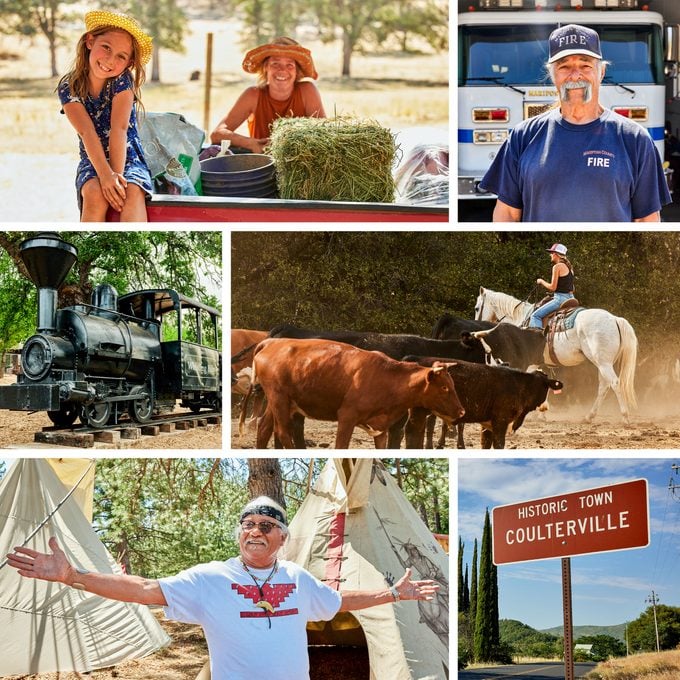
And with summer temperatures routinely topping 100 degrees, it has fires—sometimes big fires. And this, Rhodes knew, was a big fire. Eventually, this blaze would have a name: the Moc Fire, for the tiny town of Moccasin, where it began as a brush fire, origins unknown. It would burn for 10 days, consuming almost 3,000 acres.
Rhodes woke to find his Dodge covered in ash and the news broadcasting evacuation orders. Ranchers across the region were scrambling to protect their animals, loading them into trailers or just setting them loose to find safety. Volunteers were readying fairgrounds in Mariposa and Sonora to shelter animals large and small; already they were filling up with dogs, cats, chickens, horses, cattle, donkeys, llamas, goats, sheep and rabbits.
As residents and animals hauled out, firefighters poured in. With them came “the biggest bulldozer I’ve ever seen,” says Rhodes, sent to cut the firebreak that could save the town. “We knew that if it breached the cut, we’d all have to get out of here.”
The stakes were clear. The danger was growing. But slowly Rhodes realized: He hadn’t come to Coulterville just to leave when the town needed him. A Vietnam combat veteran, Rhodes had been looking for a retirement spot when a fellow vet recommended Coulterville. He quickly became enamored of the dusty old town, with its sturdy VFW and its eclectic cast of local characters. And they, in turn, embraced him. He couldn’t leave, fire be damned.
So he stayed, joining the handful of residents gathered around the Main Street bulletin board where fire officials posted updates. He knew he could help somebody, somehow.
Around midmorning, a rancher he’d never met came by asking for help evacuating animals. Rhodes’s phone was still ringing: His son still wanted him to evacuate.
The old soldier knew what to do. “I hung up my phone, got in the truck and headed down 49 to see how I could help,” he says.
Coulterville, California: Shaped by gold and disaster
Fires and floods have always been a part of life for Coulterville. So have people like Jim Rhodes. Whenever there’s a blaze, “you’ll see the community running toward the fire, not away from it,” says Dawn Huston, co-owner of Main Street’s Coulter Cafe.
Huston would know. In these dry, brushy hills, small fires crop up constantly, started by lightning, careless campers or even the motor of a hot car parked on dry grass. The state firefighters handle the big jobs, but it falls to everyone to stop small fires before they grow. “A little fire popped up on our neighbor’s property not long ago,” Huston says. “As soon as we saw it, I jumped on my quad and went to help. That’s what you do.”
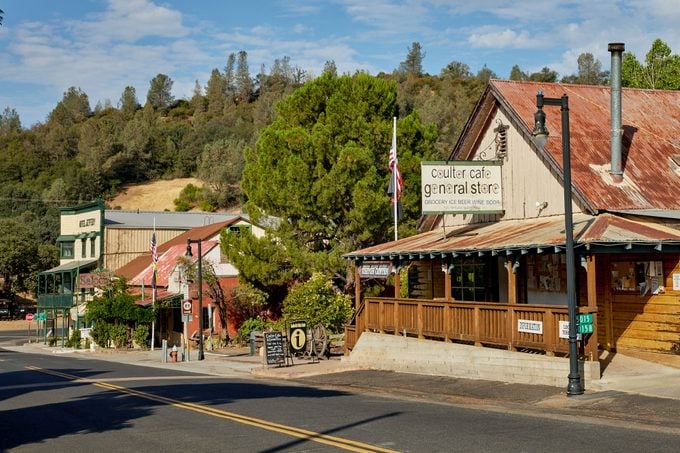
Founded around 1850 as a miners trading post, Coulterville recorded its first fire nine years later. The town would burn three times and wash away once in its first 60 years. But gold kept people coming; at its 19th-century peak the place had 5,000 people, 10 hotels and 25 saloons. Later it would become a gateway to Yosemite, bringing a steady stream of tourists to shop Main Street and dine at the historic Hotel Jeffery.
Today, most of the gold is long gone. Most of the tourists too. Wildfires keep coming, though, closing roads to Coulterville three times in the past four years. A structural fire took out the Jeffery in 2014, and it’s been closed ever since. And COVID slowed tourism across the region.
None of that has helped the town, whose precarious economy depends on a mix of ranching, tourism and anything else that might bring a dollar. While hundreds of people live on ranches large and small scattered in the hills, Coulterville’s official population is now about 125 people. If you drove past Coulterville today, you’d barely notice it.
But if you got a flat tire or ran out of gas, you wouldn’t have to wait long for help, says Huston. “You see somebody broken down on the side of the road, and you ask them if they need help, and they’ll say, ‘You’re the tenth person who’s stopped already,’ ” she says.
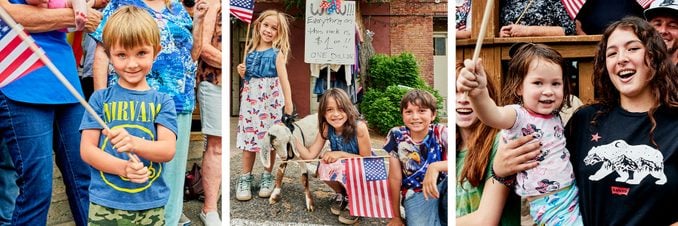
Huston grew up nearby and returned in 2010 after years in San Francisco. She and her partner opened their cafe on Main Street and bought a 35-acre ranch. Huston knows it could all disappear.
“You have to come to terms with the fact that you can lose your property, your animals, everything,” she says. So what keeps Huston in Coulterville? It’s the people. “In San Francisco, there’s 50 plumbers within a mile of your house, but I wasn’t close with all my neighbors. Here I know all of them. You rely on them in a different way.”
The tradition goes way back, says one of those neighbors, Sue Garrett. “Any time I go to town, I call around and see who needs anything,” she says. Garrett is a fifth-generation rancher, raising cattle on 1,000 acres first staked out by her great-great-great-grandfather. The building itself has never burned, but the property is crisscrossed with firebreaks from past battles.
On the day the Moc Fire sprang up, Garrett quickly realized her ranch was in a critical spot. “If the fire went through our property, it would have gone right into town,” she says. “We were the last chance to stop it.”
Sure enough, her lower pasture was soon a staging area for fire trucks and firefighters. Bulldozers began slicing through her fence lines, cutting a new firebreak and clearing out the old ones. She let loose her cattle to find safety, including the beloved bull with the black-and-white tail she calls Pepé Le Pew. It’s an old practice in a place where there aren’t nearly enough trailers to haul every animal.
“If you get a fire, you’ve got to start cutting fences,” she explains. “We paint phone numbers on hooves, or put on these laminated ID tags. Still, you might not see them for six months.”
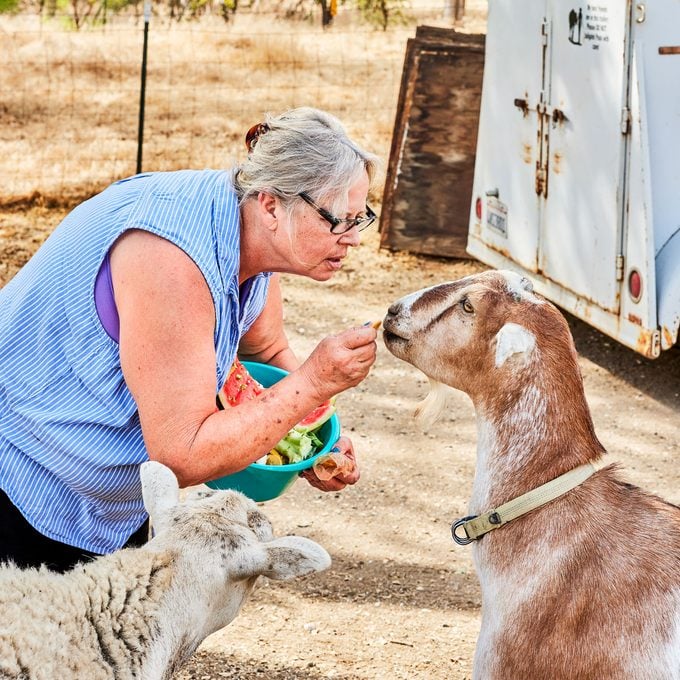
Over the next 10 days, while the Moc Fire burned, Garrett took care of animals at the Mariposa Fairgrounds shelter. Horses needed their stalls cleaned. Cattle and sheep needed food and water. The work was hot and exhausting, sometimes 18 hours a day. Garrett wouldn’t have it any other way. “We’ve got everything against us, but I don’t care,” she says. “When you have fires and floods that shut the roads, it makes you resilient. You figure things out. You go where you’re needed.”
Taking care of each other in Coulterville, California
There’s no shortage of need in the homes and ranches of Coulterville.
“Around here, $20 is 20 dollar bills,” says Jesse Salcedo. “Times are tight.”
The son of Native American farm workers, Salcedo later found success as a general contractor. Like Rhodes, he’s a veteran who came to the Coulterville area looking for that elusive combination of privacy and community.
Salcedo is now a local fixture, best known for making traditional Native American tipis that he sells or donates to charity fundraisers. His newest project is a heritage festival—Banderitas Days—highlighting Coulterville’s Mexican and Native American history. When Salcedo needed a sound system, Dawn Huston lent him a PA system. And when he needed some stress relief, Huston had that covered too.
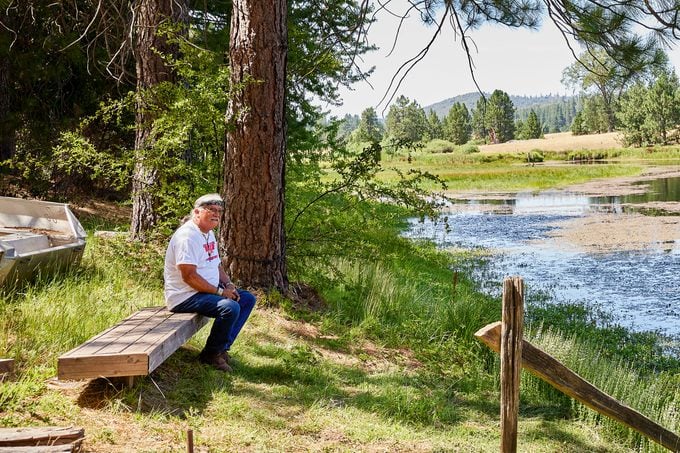
“I went over to the cafe, and she said, ‘What do you need?’ ” Salcedo says. “And I said, ‘I just need a hug.’ ”
Salcedo’s father was a member of the Pueblo tribe; his mother, a Yaqui. His Coulterville neighbors remind him of the tireless men and women who worked alongside his parents in the California vineyards. “The grit of these people—they’re survivors,” says Salcedo.
It’s one result of all those fires and floods, says Huston: a community that knows how to work together. Everything in Coulterville depends heavily on volunteers, she says, including the history museum, the VFW, the food pantries and the annual street party called CoyoteFest. The town’s residents include newcomers and old-timers, liberals and conservatives, people with money and people without. But what most locals share, Huston says, is the will to set aside differences when their place needs them to.
“It’s not what color you are, or what’s your politics or your sexuality. It’s, are you a good egg? Mostly it’s good eggs,” she says. “Everybody sees it as part of their responsibility to take care of themselves, but also to take care of their neighbors.”
On the front lines of the fire
On that sultry day when the Moc Fire closed in on Coulterville, Jim Rhodes was ready to do his part. He just wasn’t sure exactly what it would be.
The air was still. Ash and embers tumbled down. Rhodes was sitting in a pickup truck with two men he barely knew, winding up a narrow rural highway. The men didn’t know exactly where the fire was; the haze was too thick. They knew that if the wind stayed down, it probably wouldn’t move very fast. But they also knew that if the wind rose, all bets were off.
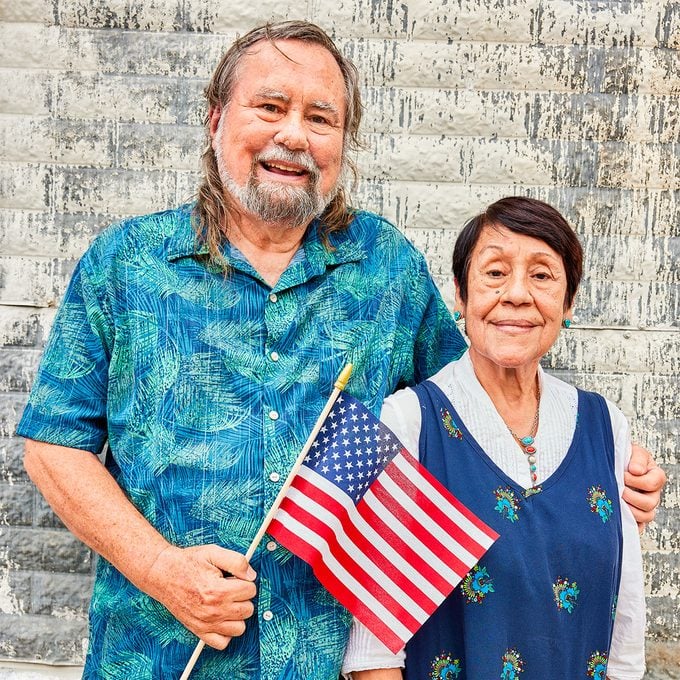
Either way, there was no turning back. So he let his combat training kick in. He was on a mission. His team was with him; the only way to go was forward. And the next thing Rhodes knew, he was in some stranger’s barnyard, surrounded by frightened horses and goats. “The animals knew something was up,” he says.
The work went quickly. The rancher gave them laminated ID tags on necklaces to slide over the animals’ heads before setting them free; with those in place, any animal that didn’t make it home on its own could be picked up. Rhodes struggled to get the necklaces over the frightened horses’ necks. The goats were easier. “Their necks are lower,” Rhodes says.
The little crew did the same thing at a second ranch. By then, the fire had closed the main highway, so after helping everyone they could find, they made their way back to safety by the back roads, four hours after beginning.
Later they learned that the fire had come perilously close to jumping the firebreak. One of the homes they visited would burn—“a total loss,” Rhodes says—but the animals he set loose that day were all recovered within a week. And while the Moc Fire would burn about 2,800 acres of ranchland and forest, no lives were lost, and no major livestock losses were reported. Even Pepé the bull and the rest of the Garrett herd made it home safely.
So Coulterville still stands. It’s far from a perfect place. It has its share of troubles. Jobs and housing are scarce. Venomous snakebites will kill your calves. And, of course, fire can come anytime. It can be a hard life on both people and animals.
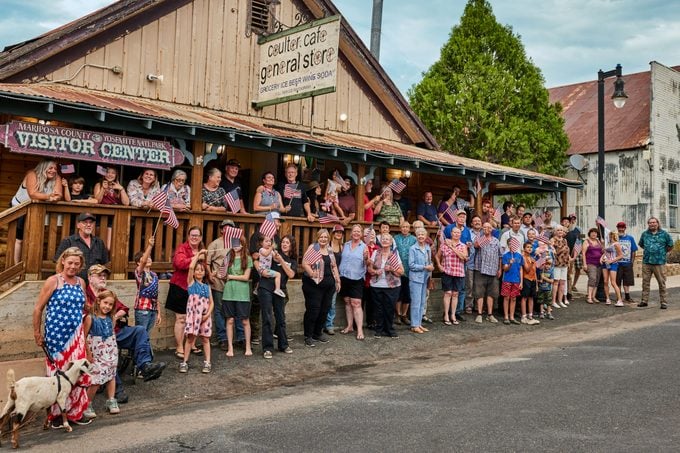
But Coulterville has thrived before, and it can thrive again. It has concerts at the cafe and theme parties at the consignment shop. It has its history museum and its gold rush attractions. It has the annual CoyoteFest, complete with music, vendors and a signature howling contest. Soon it might even have a place to sit down and eat—a new owner plans to reopen the Hotel Jeffery, complete with bar and restaurant.
“A cocktail I didn’t make myself? I can’t wait!” says Huston.
But in the meantime, there’s usually dinner at the VFW once a week. And if you meet Sue Garrett and she invites you to the ranch for tacos, don’t be shy; it’s from the heart.
“We’re not just being polite,” she says. “We wouldn’t say it if we didn’t mean it.”

